The week ahead in Parliament
- Published
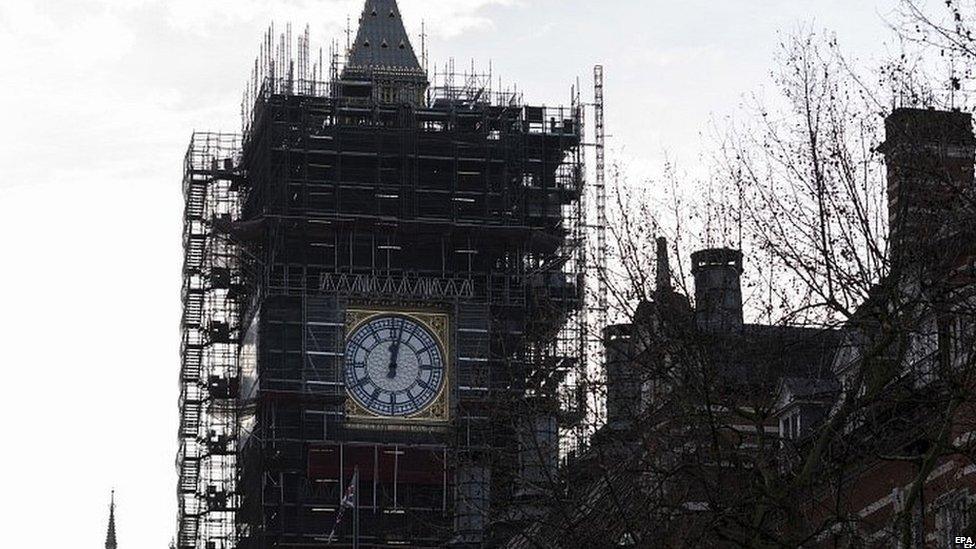
The pace is quickening in the post-Brexit Parliament.
There's a great deal of hard legislating coming down the track, on agriculture, fisheries and extradition, with further major bills on trade and immigration for dessert, a bit later on.
Meanwhile, the Commons select committee system is twitching to life, with a new set of chairs in place, and elections for ordinary members of the various committees due on Wednesday.
Also on Wednesday, the lucky winners of debating time for Commons Private Members' Bills will be announcing the titles of their chosen measures.
And then overnight, the usual collection of hard-core parliamentary masochists will stage their regular sleepover at the Public Bill Office, for the privilege of being next in line behind the ballot bills, and to get the chance to present ten-minute rule bills.
So, one way and another, backbench activity is beginning to blossom.
Debates in Westminster Hall are beginning to have an impact, too, with a very interesting 90-minute session on assisted dying last week, possibly setting the tone for discussion of that sensitive issue for the rest of the Parliament.
And MPs who've raised the issue of all-lane "smart motorways" seem to have had an impact on government policy, after the programme was put on hold by the Transport Secretary. Watch out for more backbench action around HS2, after the partisans for and against barracked each other in the Commons Chamber this week.
Here's my rundown of the week ahead:
Monday 3 February
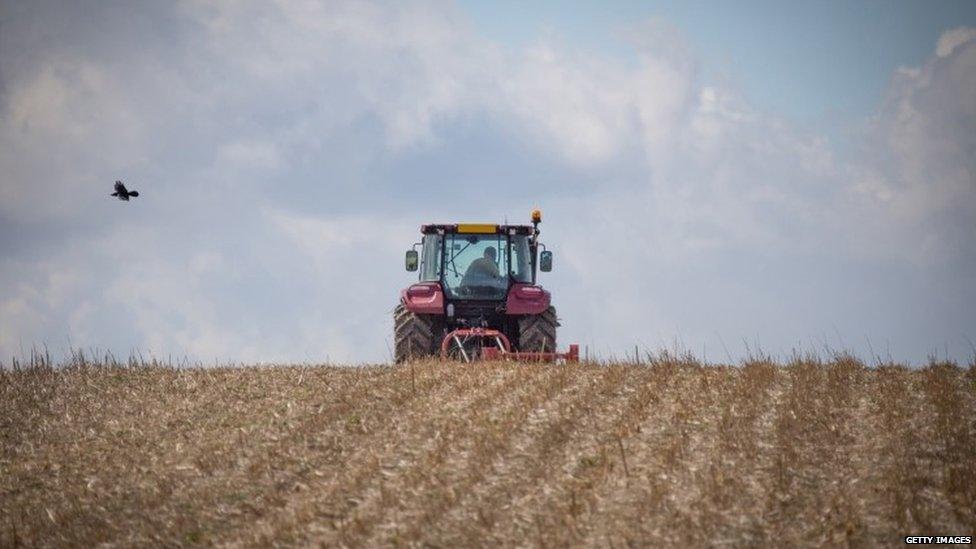
The UK is leaving the EU's Common Agricultural Policy and a new system of support for farmers will be needed
The Commons week opens, at 14:30 GMT, with Defence Questions, which should provide a debut for the new chair of the Defence Select Committee, Tobias Ellwood. And the usual crop of post-weekend ministerial statements and Urgent Questions can be expected at 15:30 GMT.
The main business is the Second Reading of the Agriculture Bill.
This is the first Agriculture Bill since 1947, and it is a very significant Brexit measure, setting out a system for UK farming and environmental protections to support farmers after the UK leaves the Common Agriculture Policy.
It begins the process of phasing in a new system over seven years, during which public money is moved away from the current subsidy system for farmers, which is based on the amount of land owned or farmed, and towards public goods, in particular protecting and enhancing the environment under land management contracts.
This would see farmers, foresters and other land managers rewarded for taking beneficial environmental action, like improving air and water quality and soil health, providing habitats for wildlife, reducing flood risk, preventing climate change and protecting or improving the health or welfare of livestock and plants.
Both Labour and the SNP have "reasoned amendments" to block the Second Reading, with Labour worried about a lack of controls on imported produce like chlorinated chicken and hormone produced beef, while the SNP complain about a lack of guarantees on food and animal welfare standards, and the Bill's impact on devolved powers.
The programme motion for the Bill sets a brisk pace, with detailed scrutiny in committee due to be completed by 10 March - which implies that the Bill should hit the House of Lords before Easter.
MPs will also vote to set up a new select committee - a kind of Son of EU Scrutiny Committee complete with a chair with extra salary - to keep an eye on EU legislation that will continue to take force in Britain during the post-Brexit transitional period.
It's not impossible that it could end up dealing with some very controversial material if the EU attempts changes that were seen as professional fouls against UK interests.
The day ends with what looks to be a significant adjournment debate, as Dame Margaret Hodge resumes her tax avoidance crusade with a debate on tax policy and Netflix.
She will argue that the streaming service pays no tax on its profits in Britain, while receiving significant tax credits - in effect grants - to make programmes here. But, at the same time, Netflix pays tax to the US government on the profits it makes in Britain.
Dame Margaret will argue that the government should make sure Netflix and similar services are properly taxed.
In the Lords, Conservative historian Lord Lexden continues his campaign over the handling of child abuse allegations against the former Prime Minister, Sir Edward Heath, with a question about when the review of the case by HM Inspector of Constabulary will be completed.
Other questions include Lord Laming, who headed a number of child abuse inquiries, asking about preventing children in council care from being placed in unregistered accommodation.
The main business is the Second Reading of the Birmingham Commonwealth Games Bill - a re-run of the Bill which fell when the general election was called.
The Bill bans unauthorised sales of Games tickets, protects commercial rights, helps to ensure transport around the Games flows effectively, and requires that the government's funding of the Birmingham 2022 Organising Committee complies with financial propriety rules.
Finally, Labour's Lord Harris of Haringey, a former Chair of the Metropolitan Police, leads a debate on protecting the safety and security of public venues.
Following the May 2017 suicide bombing at the Manchester Arena, which killed 22 people, the mother of one of the victims campaigned for anti-terror measures like metal detectors and bag searches at concert venues. The campaign has been named 'Martyn's Law' and has been supported by the government.
Tuesday 4 February
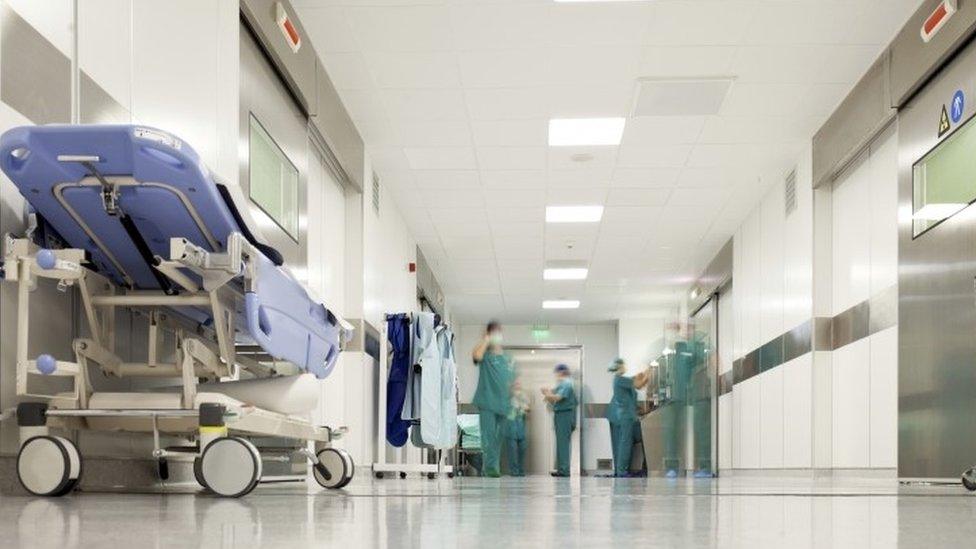
Can hospital design aid patient recovery? MPs will debate the issue
MPs open, at 11:30 GMT, with an hour of Foreign Office Questions. The main business of the day is to polish off the detailed scrutiny of the NHS Funding Bill, which locks in plans for a year-on-year increases in NHS funding for England (funding decisions for Scotland, Wales and Northern Ireland are taken by their devolved administrations).
The debates will include an English Legislative Grand Committee - the forum where only English MPs can vote, under the EVEL (English Votes for English Laws) rules.
Labour have an amendment down for a larger spending increase, and there are further Labour amendments down to specify the amounts to be spent on mental health and maternity care, while the Liberal Democrats want an annual report on child and adolescent mental health Services spending.
The SNP have proposed a couple of amendments around the financial implications of the increase in England for the NHS in Scotland - although the votes of their MPs won't apply in this stage of the Bill's consideration.
And there's a backbench amendment, fronted by the Conservative Bob Blackman and supported by the Greens' Caroline Lucas, for a levy on tobacco companies to fund measures to reduce smoking.
Expect a bit of SNP theatre around their continuing objections to the whole EVEL process.
Then MPs will vote on a Statutory Instrument which changes the way changes to small business non-domestic rates in England are calculated, pegging them to the consumer prices rather than the retail prices index. The result should be smaller increases in the rates bill, from April.
In Westminster Hall, former Cabinet Minister Maria Miller leads a debate on innovation in hospital design. Her local hospital, in Basingstoke, is one of the 40 hospitals designated by the government as needing to be rebuilt, but the NHS guidelines on design have been criticised by architects as being out of date.
Her contention is that when hospitals were built under the Private Finance Initiative, fund managers wanted safe, tested designs and were not keen on innovation - but there is now plenty of research which shows that incorporating specific design features including natural light, views of the natural environment and low levels of noise make a significant difference to patient recovery rates.
She wants to know what the Department of Health is doing to bring their design guidance up to date. The added bonus is that shorter hospital stays would mean better value for taxpayers.
The new Labour MP Nadia Whittome has a debate on climate justice, at 14:30 GMT. As the youngest MP she has already argued that school climate strikers like Greta Thunberg have alerted governments to the scale of the crisis.
At 16.00 GMT, the Green Party MP Caroline Lucas raises the issue of local housing allowance rates for homeless young people. She will argue that vulnerable young people are being trapped in hostels because under-25s receive the lowest shared accommodation rate of Local Housing Allowance, leaving them "bed-blocking" emergency accommodation and unable to find a safe place to live.
She says it would cost just £3.7m a year to give vulnerable homeless young people the chance to move on.
Finally Conservative MP Kevin Hollinrake leads a debate at 16.30 GMT on the Cranston Review, which examined the much-criticised compensation process run by Lloyds HBOS for small business customers mistreated, and sometimes driven to bankruptcy, by their bank.
Mr Hollinrake, who chairs the all-party group on Fair Business Banking, will argue that the lesson of the review is that banks should not oversee the compensation process for their own failings.
In the Lords, at 14.30 GMT, ministers face questions on the Post Office's power to conduct prosecutions, the availability of free cash machines, and plans to improve the use of data science in government processes - which might just be a Dominic Cummings-related question.
The main debate is on the Second Reading of the Extradition (Provisional Arrest) Bill - this is a Brexit bill which partially replaces the European Arrest Warrant by creating a new police power to enable the immediate arrest of a fugitive wanted by "trusted international partners" whose red notices and criminal justice systems are accepted by the UK. It would apply where a serious offence has been committed and the suspected person would pose a risk to the public if at large in the UK.
There will also be a 90-minute debate on the care of people suffering from eating disorders.
Wednesday 5 February
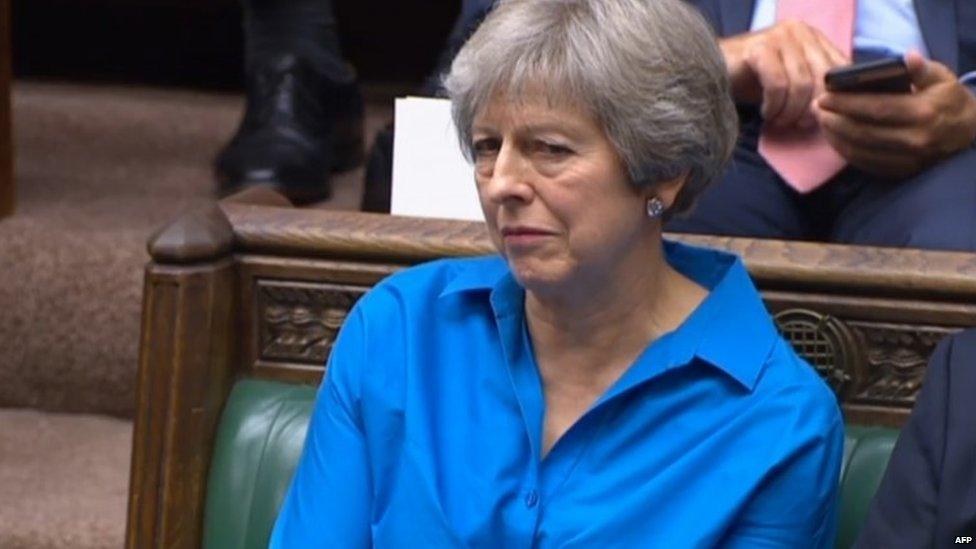
Former prime minister Theresa May will lead a Westminster Hall debate on train services in her Berkshire constituency
Proceedings in the Commons begin (11:30) with half an hour of Northern Ireland Questions, followed by the new-look, slimline Prime Minister's Question Time, now being rigorously kept to half an hour by Speaker Hoyle.
Before the main debates, the 20 MPs who won a place in the Private Members' Bill Ballot will announce the titles of the bills they plan to bring in. Some will have been telegraphed well in advance, and only the top seven have guaranteed Commons time for their Second Reading debate. But this is the moment when a number of new Commons sagas begin
The government is suddenly being generous with Opposition Days, to the extent that it is not only allowing them to happen, but it is also contesting the motions put down by Labour.
Before the election, with a shaky non-majority, it first tried to ignore Opposition Day motions by not contesting the votes and then stopped scheduling them at all. Labour has put down motions on local government finance (ahead of next Wednesday's debate on the annual announcement of grants for local councils) and on transport.
There's a very significant debate in Westminster Hall, at 09:30 GMT, on Operation Augusta. This was the Greater Manchester Police inquiry into organised child abuse gangs. Manchester MP Graham Stringer will raise questions about how the inquiry ended without dealing with some known abusers and leaving victims unprotected - resulting in what he regards as a "shocking failure" to protect young women.
He will discuss the roles played by the police, local authorities and the government, and suggest that the lessons need to be learned well beyond Manchester.
That is followed, at 11.00 GMT, by a debate on User-Led Social Care, led by newly-elected Labour MP James Murray who was previously London's Deputy Mayor for Housing.
He wants to promote co-operatives in the social care field, something attempted by his local council in Ealing. This should include a right to first refusal for social workers to step in and take over failing private organisations which provide social care.
Other debates include one on taxation on beer and pubs, a Westminster Hall hardy perennial, former Prime Minister Theresa May on local rail services in her Maidenhead constituency and the use of release under investigation, led by Labour lawyer Bambos Charalambous.
In the Lords, at 15.00 GMT, question time covers the protection of animal welfare and environmental standards in post-Brexit trade deals; support services for children traumatised by crime and government plans to achieve net zero greenhouse gas emissions by 2050.
The main business is the Second Reading of another bill which was lost because of the general election - the Divorce, Dissolution and Separation Bill.
The Government says the aim is to "remove issues that create conflict" in the divorce process and ensure the decision to divorce is a "considered one" and minimise the impact of divorce on children.
The Bill is intended to replace an adversarial, accusatorial process with a simplified approach to divorce, which provides an opportunity for reconciliation, removes the existing fault-based requirements and allows for joint applications.
The background to the Bill is the Supreme Court case of Owens vs Owens in which the court refused to allow a contested divorce on the basis that the marriage had not broken down irretrievably, which led to calls for a change in the law. Look out for a maiden speech by Baroness Ruth Hunt - chief executive of the gay rights group, Stonewall.
Thursday 6 February
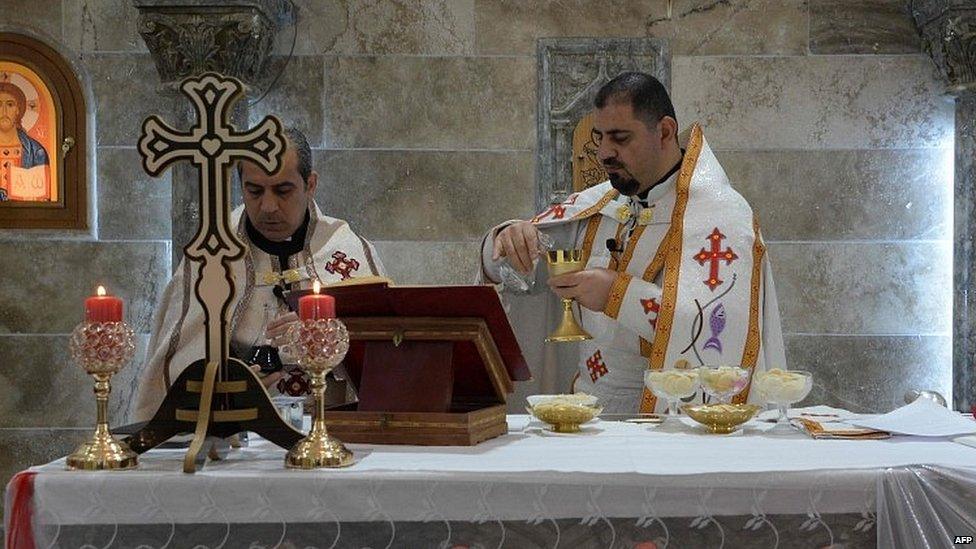
MPs will debate the persecution of Christians
The Commons day opens, at 09:30 GMT, with a series of mini-question times.
It will kick off with forty minutes of Environment, Food and Rural Affairs Questions, after which there are questions to the MPs who speak for the Church Commissioners, the House of Commons Commission, responsible for the administrative side of the Commons, the Public Accounts Commission and Speaker's Committee on the Electoral Commission.
Then comes the weekly Business Statement from the Leader of the Commons, setting out what is expected to be an increasingly heavy programme of Brexit legislation.
The main debates are on Historic Stillbirth Burials and Cremations, and on the Persecution of Christians. With the Backbench Business Committee beginning to take shape - its chair Ian Mearns was re-elected unopposed and the members will be elected next week - it will soon be in a position to take over its traditional Thursday afternoon slot and start choosing the subjects to be debated there.
In the Lords, at 11.00 GMT, the first business is the introduction of the new Lord Bishop of Blackburn, the Rt Rev Julian Henderson. Questions to ministers (and unusually to the deputy Lord Speaker) cover protecting the right to freedom of religion and plans to keep peers informed about the restoration of the Victorian Palace of Westminster.
The main debates are on subjects chosen by backbench peers - first, the NHS's performance in relation to its priority area targets; and the impact of adult social care pressures on patients of the NHS, led by Labour peer, Lord Hunt of Kings Heath.
There will then be a ninety minute debate on the government response to the Cairncross Review on the future of journalism led by the crossbencher and film director, Baroness Kidron.
Finally, there will be a debate on technological and lifestyle efforts to address climate change, and to meet the 2050 net zero carbon emissions target, led by the former Labour Defence Secretary, Lord Browne of Ladyton.
Friday 7 February
The Commons will not be sitting, but peers will be starting work, at 10:00 GMT, on their new crop of Private Members Bills.
First up is the Second Reading of the Domestic Premises (Energy Performance) Bill from the Lib Dem Lord Foster of Bath. This aims to put the current fuel poverty target into primary legislation and make it a legal requirement for the government to meet a further target: that as many homes as possible are improved to EPC band C by 2035.
Then comes the Second Reading of the Conservative Lord Naseby's Extension of Franchise (House of Lords) Bill, which will abolish the laws banning peers from voting in elections to the House of Commons. This ban dates back to at least 1699.
Finally, there's the latest incarnation of the Crossbencher Baroness Finlay of Llandaff's Access to Palliative Care and Treatment of Children Bill.
This would place a duty on the Health Secretary to ensure that NHS clinical services commissioners in England arrange palliative care services, for adults and children.
Peers almost never vote down a bill at Second Reading, but even if they approve a bill the main obstacle is getting their end product debated in the Commons, where they have no priority whatsoever for debate.
- Published29 January 2020
